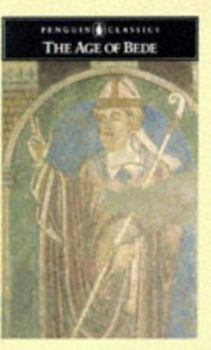Book Overview
This selection of writings from the sixth and seventh century AD provides a powerful insight into the early history of the Christian Church in England and Ireland. From Bede's Life of Cuthbert and... This description may be from another edition of this product.
Format:Mass Market Paperback
Language:English
ISBN:0140444378
ISBN13:9780140444377
Release Date:July 1983
Publisher:Penguin Group
Length:255 Pages
Weight:0.50 lbs.
Dimensions:0.6" x 5.0" x 7.7"
Customer Reviews
3 ratings
Ian Myles Slater on: New and Expanded
Published by Thriftbooks.com User , 20 years ago
This Penguin Classics volume has had a somewhat complicated history, and those who are familiar with earlier editions, and wondering whether to bother with the new one, or are not familiar with it at all, and are considering a used copy, should be aware of the differences. It began as a shorter (206 page) Penguin Classics volume called (a little grandly) "Lives of the Saints," published in 1965. This version, edited and translated by J.F. Webb, contained the *The Voyage of Brendan,* Bede's *Life of Cuthbert* (from the prose version), and the *Life of Wilfrid,* by Eddius Stephanus. The first is a legendary account of the supposed sea voyages of an actual Irish abbot, and was one of the most popular works of the Middle Ages. The Venerable Bede's account of St. Cuthbert was commissioned by a monastic community devoted to his memory, and is based mainly on an earlier anonymous "Life," which Bede himself had earlier adapted in verse, and had drawn on for a much less miraculous account of its hero in his "History of the English Church." This complicated redaction history is not unusual, but for once we know that three of the versions came from the same hand. The "Life of Wilfrid" is a partisan account, by one of his followers, of a Northumbrian bishop who somehow managed to have almost as many disputes with his friends as with his enemies. (Bede also deals with Wilfrid in his "History," with considerably less enthusiasm than Eddius shows.) This version had considerable internal coherence, as it illustrated the variety of literature found under the heading of "Lives of the Saints," and various roles as edifying entertainment, institutional piety, and partisan propaganda. The three texts are also roughly contemporary, and, as should be clear, reflect Irish and British traditions of hagiography. It was reprinted through at least the mid-1970s (I have a copy from 1975). The quality of the translations of all three is fairly high, although some readers initially entertained by Brendan's symbol-laden adventures in a visionary North Atlantic were probably let down by the increasingly terrestrial and political tone of the remainder. "The Voyage of St. Brendan" (not to be confused with the Latin and Middle Irish "Lives" of this saint) is connected to a larger body of secular accounts of fantastic sea voyages from medieval Ireland (Maelduin, Bran, and others, some no longer extant). It is not clear which Irish tradition influenced the other, however. Bits and pieces of the Brendan version seem credible, but their connection with him may be as much an invention as the psalm-singing birds and terrestrial paradises he and his monks are said to encounter. Since the other Irish voyage stories (*immrama*) seem to have been unknown elsewhere, and the Latin "Voyage" was both copied and translated throughout Europe, it should be credited with a major role in making Irish literary motifs a part of the European tradition. It probably is in the background of William M
"A Fascinating Read"
Published by Thriftbooks.com User , 23 years ago
This edition is comprised of the venerable Bede's "Life of Cuthbert" and the "Lives of the Abbots of Wearmouth and Jarrow; the priest Eddius Stephanus' "Life of Wilfrid;" and also included is the "Voyage of St Brendan" and the "History of Abbot Ceolfrith." These works brim with saintly tails of healings and exorcisms, and of prophecies and portents. These books contain some interesting historical information as well: such as the spread of Christianity on the British Isles during the sixth and seventh centuries. The introduction provides both a comprehensive look at the individuals who wrote these books and a general picture of they age they lived in. These books will no doubt be a fascinating read for anyone interested in the history of Christianity in Britain, or just in good simple hagiography.
Bede's Church
Published by Thriftbooks.com User , 23 years ago
St. Bede is mostly known for his history of the Church in England, but his Life of Cuthbert is a wonderful read. The language is simple and eloquent, and the translation is excellent. Medieval logic can seem overly simplistic to the modern mind, but Bede is straightforward and concise. In contrast, Eddius' Life of Wilfred seems downright wily. Perhaps this makes it all the more enjoyable, as we discern the writer's own agenda. Trying to find the personalities behind the facts and misrepresentations makes for one of the most enjoyable medieval texts I've read in a while.






